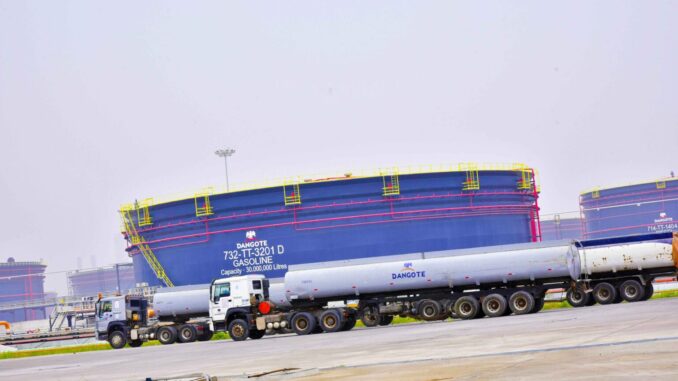The Dangote Refinery starts exporting petrol to other West African nations, marking a significant step in its operations. A recent shipment showcases the refinery’s growing capacity to impact regional fuel markets.
According to industry reports, the tanker CL Jane Austen transports over 300,000 barrels of petrol from the refinery to waters off Togo. The vessel is currently stationed near Lomé, a key location for ship-to-ship (STS) fuel transfers, suggesting the cargo may be redistributed to other destinations.
Regional Impact and Growing Influence
This shipment underscores the potential of the Dangote Refinery to reshape fuel markets in the region. Although the volume exported is small compared to global trade, it signals the refinery’s production ramp-up and readiness to supply beyond Nigeria.
In October, the refinery also delivered its first petrol shipment to Lagos, demonstrating its capability to cater to both domestic and regional demand. However, the extent of future exports remains to be seen.
Neighboring Countries Eye Dangote’s Output
Several African nations, including Ghana, Togo, Benin Republic, and South Africa, are exploring opportunities to import petroleum products from the Dangote Refinery. Ghana’s chief oil regulator, Mustapha Abdul-Hamid, recently highlights the benefits of sourcing petrol from Nigeria, citing reduced freight costs and relief for the country’s foreign exchange market.
“With the refinery’s full capacity, Nigeria cannot consume the entire output alone. Importing from Nigeria rather than Europe would significantly lower costs and help stabilize prices,” Abdul-Hamid notes.
A Transformative Project for Nigeria and Africa
The $20 billion Dangote Refinery is poised to become Africa’s largest and one of the world’s most significant refineries. With a processing capacity of 650,000 barrels per day, it aims to reduce Nigeria’s reliance on imported petroleum products drastically.
This development positions Nigeria as a major player in the oil market while fostering stronger trade ties with neighboring countries and addressing domestic energy demands. The refinery’s operations signal a turning point for both Nigeria’s economy and Africa’s fuel landscape.













